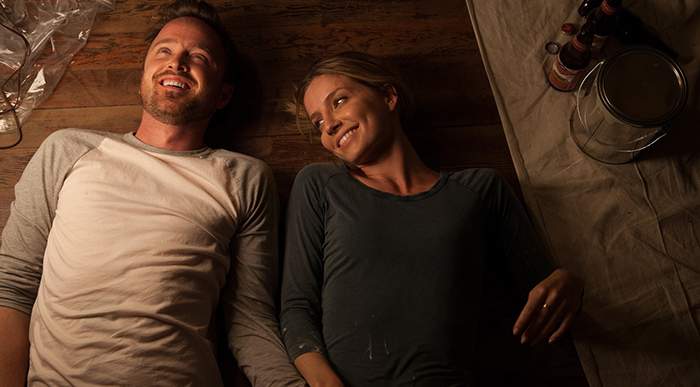Come and Find Me stars Aaron Paul (Breaking Bad’s Jesse Pinkman) as a graphic designer who wakes up one day to find that his photographer girlfriend (Annabelle Wallis) has vanished without a trace. It’s not until he runs into one of her old friends a year after she has disappeared that Paul’s character, David, begins to realize that he never really knew the woman whose name could be Claire or Eve or Sarah or any other number of aliases.
At first, he must deal with the emotions he’s kept locked up, not knowing whether she was abducted, killed, or just ran out on him. The sudden loss coupled with uncertainty was painful, so when a possible lead comes up, he’s compelled to keep searching for her. Through numerous flashbacks it becomes apparent that clues to her true identity/past were there all along.
It’s hard to resist a good mystery. There’s a certain thrill of figuring out a puzzle, of going out digging and getting answers that lead to more questions that lead to that final revelation. There’s enough intrigue in Come and Find Me to keep audiences engaged, although plot-wise it’s mostly standard stuff: the warnings from villains to stop snooping around; the scramble for an incriminating piece of evidence, the discovery of a major clue by sheer coincidence, etc.
What’s more interesting—and it’s done subtly enough not be noticed right away—is the reversal of expected gender roles. There are moments where, if this were some other movie, Claire would be doing the things we see David doing, and vice versa. The film, written and directed by Zack Whedon, also plays loose with time. Instead of the usual let’s-start-with-the-climax-and-then-go-back-to-the-beginning-of-the-story arc that’s been done a million times, it leaps back and forth in an almost rhythmic pattern that, although jarring at first, starts flowing a lot more fluidly later on.
In the end, here’s who will probably like the movie: anybody down to watch cool guy Aaron Paul play an amateur detective and overlook quibbles like thugs who give up info just a tad too easy, as well as those who enjoy low-key romantic moments (it could make for a good date night option). But it really depends on whether or not you buy into the relationship between David and Claire.
The day before Come and Find Me hit theaters, the xx released “On Hold,” a song about lovers who have grown apart. The single is in no way associated with the film, but when we compare the two, we find that the woman in the song seems aware of where things went wrong with her ex and is ready to move on (“I can’t hold on to an empty space”). The man, in turn, seems like he took her for granted and fancied himself in control (“And every time I let you leave / I always saw you coming back to me”), and was somewhat oblivious of where they stood (“When and where did we go cold?”).
In Come and Find Me, it’s the woman who seems unaware of the subtleties of their relationship as she’s blinded by the goings-on of her secret life, which take precedence, and it’s Aaron Paul’s character who is hanging on to an empty space, quite literally, as she’s completely disappeared from his life. When we go back and see them together earlier in their relationship, however, it’s difficult to get any deep connection between David and Claire. Sure, they had good times and shared some personal experiences, but one feels more passion coming from a song that’s just over three and a half minutes long than a movie that lasts almost two hours.
Maybe it’s the lonely Los Angeles backdrop that lessens the spark between them. Or perhaps David’s quest is driven by guilt and the understandable need to redeem himself for something he believes he’s responsible for, and along the way has convinced himself that he’s in love. Or maybe they really are in love and viewers will pick up on that.
The true test, though, will be the film’s bookends: The opening scene runs the risk of being too cutesy, as the couple pretend to be strangers after a bus ride home one evening. “Are you following me?” she asks, which is, of course, exactly what David will be doing for the rest of the movie. And then there’s the way more risky symbolic ending that may frustrate some, but that at least defies convention, which is something that’s hard to find in movies these days.











